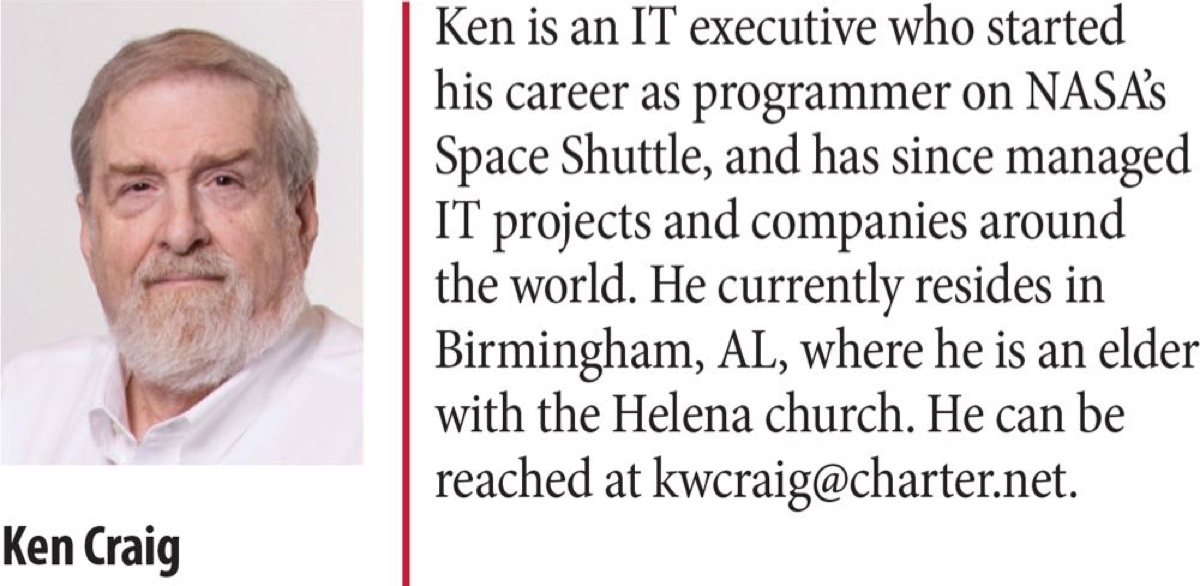By Ken Craig
Synopsis: Confronting and correcting misconceptions is an important part of evangelism, but our essential task is to share the story of redemption, which centers upon the sacrifice of Jesus Christ.
Several years ago, I was on a West Coast business trip. There was a dinner that evening at the home of the man hosting the business meetings. Afterward, I discussed spiritual things with an agnostic and the evangelical couple hosting the dinner. The conversation wandered all over the place until around midnight, when I asked if they could give me thirty to forty minutes to explain how our topics blended. They then asked if their sixteen-year-old son could join us! After awakening him, I explained how the Bible “fits together.” When I finished, the agnostic stated that he had never heard that before and it made a great deal of sense. I then asked him if it changed how he felt about Jesus Christ. He thought for a minute and said that he now believed, and he would like to be baptized and have his sins removed! Before I could react, the sixteen-year-old asked if he, too, could be baptized! Then the evangelical couple stated that they, too, needed to be baptized! So at one in the morning, we went to their swimming pool and baptized the four of them.
I had never had a similar experience! If you had asked me prior to this, what would you say to an agnostic, I would have proposed discussing modern “free thinker” objections to the historicity and deity of Christ and philosophical objections such as the problem of evil. What would I have proposed discussing with evangelicals? Probably Bible authority, along with the work and worship of the church. What would I have proposed for teenagers?—Probably, their place in the universe and the purpose of following the will of God.
In forty minutes, I delivered a very simple lesson to which an agnostic, a teenager, and evangelicals had all responded. Rather than arguing with them about the response of baptism, they were appealing to be baptized! My mind was screaming, what did I just say to these people that demonstrated such power? As I contemplated this on the flight home, I deconstructed my message, and soon realized that I had simply encountered the simplicity and power of the gospel.
As I taught this message to others, I soon realized how powerful this message was. In Romans 1:16, Paul affirms “For I am not ashamed of the gospel, for it is the power of God for salvation to everyone who believes, to the Jew first and also to the Greek.” I came to realize that His statement to the Corinthians was no hyperbole: “When I came to you, brethren, I did not come with superiority of speech or of wisdom, proclaiming to you the testimony of God. For I determined to know nothing among you except Jesus Christ, and Him crucified” (1 Cor. 2:1-2)
Furthermore, the parable of the sower resonated. Our aim is to sow the seed, not to “help” the seed by becoming a soil inspector. The sower sowed everywhere. Our duty is to sow the seed and not try to predetermine the quality of the soil (heart) into which it lands. Our job is to teach God’s word and let Him worry about the hearts! I now understand that every time we sow the seed, we are successful, regardless of whether a conversion results. Please consider the following observations about sharing the gospel message.
Every time we think we can improve the gospel by our wisdom, our techniques, or methods, we are, in fact, diminishing the power of the gospel and God’s glory and purpose. Those that try to “improve” on the gospel inevitably think that we can get more converts by our methods and that God is well-pleased. How did that work out for the Galatian Christians when they decided that adding circumcision would help in their efforts to convert the lost? Let’s recognize that the gospel needs nothing added to make it more appealing to people. When people are converted by this simple but powerful message, God receives all the glory. His message accomplishes His desired effect.
I visit congregations all over the world, and most are very small. They are often concerned about their small size. I tell them that if they do things the way God wants them to, they will be just as big as God wants them to be. Size doesn’t matter. Consider God’s whittling down of Gideon’s army so that the victory could be attributed to nothing less than His purpose and power.
As noted earlier, Paul encouraged the Corinthians by reminding them that he did not use superior speech or wisdom, but only the knowledge of Jesus Christ and Him crucified. This is powerful! On this basis, Christians are expected to “sanctify Christ as Lord in your hearts, always being ready to make a defense to everyone who asks you to give an account for the hope that is in you, yet with gentleness and reverence” (1 Pet. 3:15). The hope that is within us is the gospel (Col. 1:23). If we became Christians by the attraction of the gospel, we should all be able to explain that truth to anyone—no special wisdom or skill required!
If we understand that our objective is for people to hear the gospel, and that is where the actual power of salvation resides, I suggest we dogmatically lead with the gospel, and try to let nothing deter us from that. When Paul was on Mars Hill among all the philosophers and theologians, notice that he led with the message of the death, burial, and resurrection of Christ. When he finished, many wrote him off as crazy, but others responded by wanting to hear more. It was then that he engaged in the discussion about false gods.
A Pentecostal lawyer was trying to convert one of our lawyer members, and he invited him to church. He showed up at services, approached me, and stated that he had “Thirty questions about the Church of Christ” that he wanted to discuss (and was armed with a three-ring binder labeled “Church of Christ”!). I replied, “I’m your man!” However, I went further and told him that if we started discussing his thirty questions, we would just start arguing because we did not see the Bible the same way, and would he give me forty minutes to explain how I see the Bible. “Of course,” he replied. I’m sure he thought, “What could I do in forty minutes!” Yet, forty minutes later, he and his wife wanted to be baptized. After I baptized him, we had an extended Bible study to address his questions. Having the gospel as a foundation made answering the questions much less arduous. By the way, he is now a gospel preacher.
For much of my life, I was a “soil inspector” looking for people that were believers so that I could attempt to straighten out their errors in work and worship. It was a negative approach, and most of the time, I was so tied up in debating and arguing that they never heard the gospel at all. However, the gospel message of salvation presents a very positive (though bloody) message that elegantly shows the unity of the Bible and how Christ fulfills this through His love of the Father and His eternal sacrificial purpose.
Remember, the aim is for them to hear the gospel, not to amaze them with our command of Bible knowledge or ability to answer every question. In fact, I always tell people I will defer questions (unless it is something they don’t understand) until after the message is presented. I am often interrupted during the presentation by someone wanting to discuss some point of doctrine. I politely defer the question until after the presentation. Most of the time, their questions melt away from the gospel message itself. If we “chase the rabbits” of every imaginable question, they may never hear the gospel!
I cannot remember once getting into an argument with anyone after presenting the gospel. It seems to resonate with everyone to whom I present it, whether a believer, Muslim, agnostic, or atheist. I pressure no one. Sometimes they need to go away and count the cost. I have had many situations where someone has called me hours, days, months, and even years later, to respond. The gospel has a supernatural ring of truth that will work on good hearts—sometimes fast, sometimes slowly.
I have been able to convert several atheists and agnostics by first sharing the gospel and then following up with further study. I then ask them to read The Case for Christ by Lee Strobel. It is a good story of his journey from atheist to believer by a systematic investigation of Christ using his professional skills as an investigative journalist, which he employed with the Chicago Herald Tribune. Following that, the discussion can go in many distinct lines of inquiry, from the philosophical to the scientific. There are many good general books on evidences that address a broad range of topics. I recommend a book by Rob van de Weghe, a Dutch scientist by education, with whom I shared the gospel. Formerly an athiest, Rob became a Christian after two years of discussion, and eventually wrote Prepared to Answer. It takes a systematic approach to apologetics and even has a chapter included on the plan of redemption. The references cited can lead you to drill down further on any of various topics, be they philosophical or scientific.
I present lectures all over the world and domestically on “The Big Picture of the Bible” to train preachers and Christians in sharing the gospel. These lectures are reflected in my little book by the same title.
My prayer is that the gospel will create within us a passion to teach about God’s justice and the mercy that He extends through His sacrificial system. May we willingly explain to others the life-changing truth that John announced with the sublime statement, “Behold the Lamb of God that takes away the sin of the world.” May we help them understand the significance of His sinless life, His sacrifice on the cross, and His subsequent resurrection!


